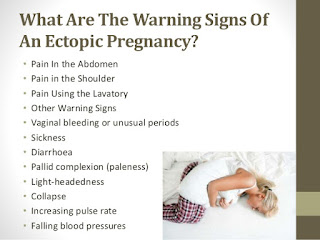What is an Ectopic Pregnancy?
If a fertilized egg implants outside the uterus, it's called an ectopic pregnancy. There's no way to transplant an ectopic pregnancy into your uterus, so ending the pregnancy is the only option. This means the egg will not develop into a baby, which can be devastating to the pregnant woman.While there are some risk factors, an ectopic pregnancy can happen to anyone. And, because it's potentially dangerous for you, it's important to recognize the early signs and get treatment as soon as possible. Occasionally, an ectopic pregnancy doesn't cause any noticeable symptoms and is only detected during routine pregnancy testing.
However, most women do have symptoms, and these usually become apparent between week 5 and week 14 of pregnancy.
They include:
- abnormal vaginal bleeding
- abdominal pain, typically just in one side, which can range from mild to severe
- an absent period (amenorrhoea), and other symptoms of pregnancy
What Causes and Ectopic Pregnancy?
After conception, the fertilized egg travels down one of the fallopian tubes on its way to the uterus. If the tube is damaged or blocked and fails to propel the egg toward the womb, the egg may become implanted in the tube and continue to develop there.Because the vast majority of ectopic pregnancies occur in a fallopian tube, they're often called "tubal" pregnancies. Much less often, an egg implants in an ovary, in the cervix, directly in the abdomen, or even in a c-section scar.
Treatment Options for an Ectopic Pregnancy
Unfortunately, the baby from an ectopic pregnancy cannot be saved. The pregnancy has to be terminated before it threatens the mother's life. If an ectopic pregnancy is not detected early enough, it can lead to the fallopian tube or ovary rupturing which can result in internal bleeding thereby threatening the mother's life.If the ectopic pregnancy is diagnosed before your fallopian tube ruptures, you have the following treatment options:
- active monitoring – where you receive no immediate treatment but your condition is carefully monitored. Sometimes, the pregnancy will be absorbed into the body by itself without any treatment needed.
- medication – a medicine called methotrexate (known by many as an abortion pill)can be used to stop the ectopic pregnancy growing. This option can be used if the embryo is still small.
- surgery – surgery can be used to remove the egg. The option used depends upon how far the pregnancy has progressed. This type of surgery is a laparascopy: which is
- If there has already been a rupture which has led to internal bleeding, the only option will be a surgery.
An ectopic pregnancy can be removed from a fallopian tube by using salpingostomy or salpingectomy.
- Salpingostomy. The ectopic growth is removed through a small, lengthwise cut in the fallopian tube. The cut is left to close by itself or is stitched closed.
- Salpingectomy. A fallopian tube segment is removed. The remaining healthy fallopian tube may be reconnected. Salpingectomy is needed when the fallopian tube is being stretched by the pregnancy and may rupture or when it has already ruptured or is very damaged.
Photo Credits
1. http://www.emedicinehealth.com/ectopic_pregnancy/page2_em.htm
2. http://www.slideshare.net/janetmillerGA/ectopic-pregnancy-a-better-understanding-37064317





Thanks for posting this information. This would create an awareness among many individuals. The best gynecologist in Chrompet offers treatment related to female reproductive system. They have well experienced gynecologists and specialists who provide the best treatment. Their main focus is to care for the patients.
ReplyDelete